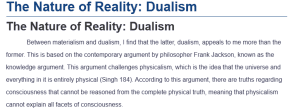The Nature of Reality: Dualism
Between materialism and dualism, I find that the latter, dualism, appeals to me more than the former. This is based on the contemporary argument by philosopher Frank Jackson, known as the knowledge argument. This argument challenges physicalism, which is the idea that the universe and everything in it is entirely physical (Singh 184). According to this argument, there are truths regarding consciousness that cannot be reasoned from the complete physical truth, meaning that physicalism cannot explain all facets of consciousness.
The argument states that an individual can have all knowledge of all the physical facts but still not have access to certain subjective experiences, known as qualia (Singh 181). For instance, one can have knowledge of all kinds of sounds. However, the experience of hearing music like a violin changes this knowledge to something else entirely because it gives them a whole different understanding due to a completely different experience, a more spiritual experience. This suggests that physical knowledge alone is unsatisfactory for understanding consciousness, indicating the existence of non-physical parts of the mind that dualism may explain. For instance, gut instinct or intuition, particularly when it comes to predicting that something is incorrect or will go wrong and then it turns out to be true. In seemingly harmless situations, this instinct has saved the lives of numerous people who “listened to their gut” and were ultimately safe. These aspects happen in an instant that cannot be explained by physicalism. I believe that these are some of the parts of the mind that are nonphysical and somehow interact with other nonphysical parts of the world, and thus, feelings of fear or thoughts of danger come into our minds.
Work Cited
Singh, Arpita. “Explaining Qualia.” (2020). https://ir.nbu.ac.in/server/api/core/bitstreams/3f7912d5-169d-4fcb-82da-f3978f0f2f89/content
ORDER A PLAGIARISM-FREE PAPER HERE
We’ll write everything from scratch
Question
The Ancient Greeks are credited with founding many schools of philosophy. In general, we might say that the Greek philosophers fell into two camps. Some, like the Pythagoreans and Atomists were extreme materialists. They believed that the physical world we can see and measure is all that exists. And they searched for truth by trying to understand the laws of this physical world. On the other hand, Socrates, Plato, Aristotle, and their descendants believed in universal truths or virtues that represented something greater than just the physical world. Many of their philosophies approached a belief in something like a soul, separate from the body (a belief referred to as dualism).

The Nature of Reality: Dualism
Which of these two broad schools of thought (materialism or dualism) appeal more to you? Framed another way, do you think individuals have a soul or consciousness that is separate from their physical bodies? Or is our consciousness something that only exists due to the working of our brains?

